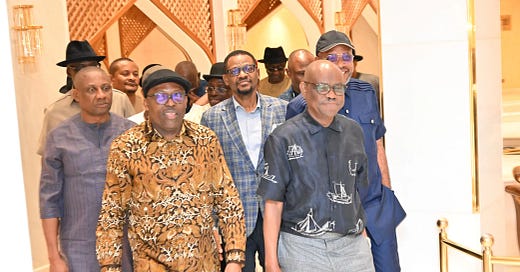The price of peace
President Tinubu brokered a Rivers State truce: Fubara reportedly agreed to forgo 2027 re-election and accepted Wike's leadership, including nominating all PDP local election candidates.
A political truce has been reached in Rivers State following a peace meeting brokered by President Bola Tinubu between FCT Minister Nyesom Wike, Governor Siminalayi Fubara, Speaker Martins Amaewhule, and other lawmakers. After months of tension, both factions agreed to end hostilities and prioritise the state’s development. Sources revealed that the deal includes conditions: Fubara reportedly agreed not to seek re-election in 2027 and accepted Wike’s political leadership. Additionally, Wike is to nominate all PDP candidates for forthcoming local government elections, expected before October, with no internal opposition permitted.
The Rivers State political saga continues to unfold, with the actions of its key actors setting dangerous precedents that could, in the future, justify undemocratic manoeuvres. As we have previously argued, President Bola Tinubu's capture of Rivers State remains arguably his most significant political conquest yet, and, more broadly, for any party outside the Peoples Democratic Party (PDP). Rivers is not merely a PDP stronghold; it is Nigeria’s second wealthiest state, the former oil capital, and the de facto political headquarters of the oil-rich Niger Delta region. Following the questionable declaration of a state of emergency in the state a few months ago, it became evident that Tinubu views control of Rivers—regardless of whether through the camp of Nyesom Wike or that of Governor Siminalayi Fubara—as a strategic crown jewel in his 2027 re-election bid. This assumption has, so far, proven correct.
In the aftermath of this federally controlled sole administrator being imposed, several governors from the South—particularly from Akwa Ibom and Delta—alongside key former political figures such as ex-Delta State Governor Ifeanyi Okowa, have defected to the ruling All Progressives Congress (APC). More defections are expected. On the surface, Tinubu’s path to re-election in 2027 appears almost guaranteed. This is particularly true in light of recent political realignments, such as the impending defection of Rabiu Musa Kwankwaso—the former presidential candidate of the opposition New Nigeria Peoples Party (NNPP) in Kano—to the APC, following the resignation of his arch-rival, Abdullahi Ganduje, as party chairman.
Meanwhile, Wike’s nomination of candidates for the forthcoming local government elections in Rivers effectively ensures a plurality of wins for his faction. This manoeuvre not only reasserts his control over the grassroots political machinery—a traditional instrument of vote mobilisation and electoral manipulation—but also directly benefits Tinubu, who now stands to reap electoral dividends from a state his party has never managed to win at the executive level. This backroom arrangement may temporarily ease tensions between Wike and Fubara, the two principal antagonists in the state’s ongoing crisis. However, it risks alienating Fubara’s ethnic Ijaw base, who had rallied to his side when the power struggle was reframed along ethnic lines.
Nationally, if it does not eventually unravel, this type of anti-democratic compromise sends a dangerous message: that Fubara has been granted a free pass to govern without accountability—an ominous precedent that future presidents may exploit to override constitutional boundaries for personal or political gain. It is deeply troubling that the declaration of a state of emergency—a measure designed for genuine national crises—has been reduced to a mere instrument for settling political scores under the Tinubu administration. The degradation of such a critical mechanism recalls its misuse under the Obasanjo government, during the fragile early years of Nigeria’s current democratic era.
In political terms, Tinubu emerges as the sole victor. Wike and Fubara are left diminished, trapped in a delicate equilibrium reminiscent of mutually assured destruction. The governors—across party lines—who watched silently as this constitutional violation unfolded now risk the same treatment, whether under Tinubu or any successor emboldened by this precedent. It is, indeed, an ill wind that blows no good.




